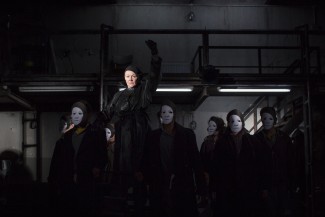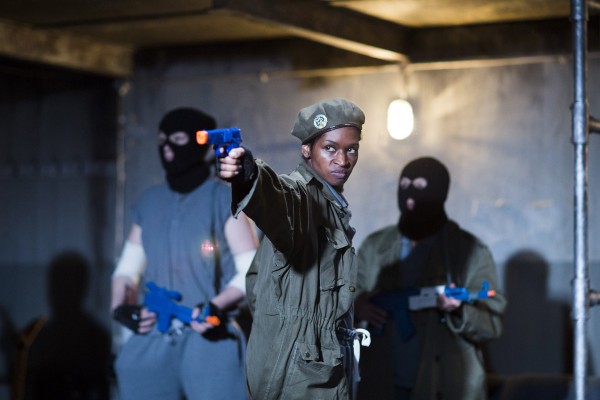Donmar Warehouse’s ‘Julius Caesar’ pulsates with verve

LONDON — The innards of the Donmar Warehouse are bleak and bare, made to look like a drab prison cell, holding back both captives and artistry. It is in this unlikely place that William Shakespeare’s Julius Caesar emerges like a phoenix. In Phyllida Lloyd’s brazen adaptation of the Bard’s classic, we’re met with violence and dread like a slap across the face. Utilizing the talents of an all-female cast, the two-hour production thrives off collective energy, making it a hellishly provocative piece of theater.
Be prepared before setting foot in this theater. Victims are aplenty.
Frances Barber plays the title character, offering a no-holds-barred approach to the iconic role. She’s the master of the prison cell, demanding respect and submission from her subordinates. He beret sits just right on her head, an outward sign that there’s only one boss in this cell block. She even has one soldier crawl around with a dog leash attached to her neck. Barber completely embodies the character, finding Caesar’s inner violence and facade of empty power. The despotism is so extreme she seems incapable of being overcome.
Harriet Walter plays Brutus, an early supporter of Caesar’s who quickly becomes her chief adversary. Walter, ever the professional, internalizes the complicated character, letting us see the anguish hang heavy on her face. Brutus, as Shakespeare has taught us, is the pivotal role in this play, a person with seemingly equal amounts of mercy and menace. There’s real heartbreak and fright that emerge from Walter’s portrayal.
The supporting cast that surrounds these two central performances is exquisite. Each actress carves out full portraits of troubled, strong women. They use Shakespeare’s language like a child would expertly work through a jungle gym, bending and swaying to the poetry of the story. The words feel very real on their lips, and that’s mostly because they’re shot through with adrenaline. From the opening scene to the ultimate death, this cast lives and breathes fire through these words. There are times when Lloyd has the actresses bang out punk rock songs and jump around the two-tiered set like a revolution were afoot. It’s believable, and everyone buys into the clamor, especially Jenny Jules, who stands out as a brutal, brutal Cassius.

Lloyd’s vision is precise and cynical. She has translated the text into a framework of captive women living a hierarchical life behind bars. She has the fascinating foresight to fool with our expectations, constantly having us question whether we’re watching reality or a staged play.
The costumes are militaristic (even terroristic) in nature. Some of the women don ski masks, while others hold plastic guns with a firm grip. Take a look at the chilly visage of those seeking blood.
Parallels to our own inner-ability for violence are made evident, and the audience is very much invited into the action. At one point, a character takes a seat in the stalls section during a crucial scene. This is not some coupe de théâtre to have the proceedings from the stage spill over into our lap. This is an indictment, a promise that we’re unable to look at these images and not be reflective on our own lives. They might be dressed in the drab clothes of a prisoner. They might yell and fight behind bars. They might seem so far away, but Lloyd (and by proxy Shakespeare) reminds us that violence can be uncomfortably close. Revenge and perceived justice can cause obsession. Preserving the status quo can seem impossible.
Lloyd has created a Julius Caesar that’s loud and fierce. Luckily for us, what this production has to tell the world is worth hearing.
By John Soltes / Publisher / John@HollywoodSoapbox.com
-
Click here for more information.

